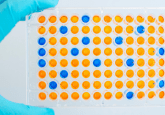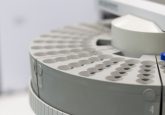The Gyrolab™ immunoassay system: a platform for automated bioanalysis and rapid sample turnaround

Access to this article is provided courtesy of Gyros.
Background: The Gyrolab™ workstation benefits from fully automated transfer of reagents and samples originating from a storage microplate onto a compact disc containing solid-phase microstructures composed of a 15 nl streptavidin-derivitized bead bed. Results: This paper describes the development, full validation and use of the method in a regulated environment to measure a humanized bispecific monoclonal antibody–domain antibody (GSK-A) molecule using the Gyrolab immunoassay system in cynomolgus nonhuman primate plasma ranging from 5 to 250 µg/ml. The method was subsequently used in support of the TK portion of a regulated preclinical study in monkeys. Conclusion: The Gyrolab immunoassay system proved to be a viable alternative to traditional immunoassays and was used to support a regulated preclinical TK study. The speed of analysis that the Gyrolab provides was beneficial in meeting timelines to complete this project as multiple assays and repeat sample analysis could be completed in the same day.
In 1986, muromonab, a murine anti-CD3 IgG2a molecule approved for the treatment of acute organ transplant rejection, became the first therapeutic monoclonal antibody (mAb) approved by the US FDA for clinical use. 27 years later there are 38 mAbs listed as being approved drug products on the Drugs@FDA website [101]. These mAbs have been used for the treatment of a variety of diseases such as cancer, lupus, rheumatoid arthritis, Crohn’s disease and inhaled anthrax to name a few. With the growing number of approved mAb therapeutics available and the complex nature of many diseases involving multiple signaling pathways, combination mAb therapies are being studied as possible treatments for diseases such as mantle cell lymphoma [1], leukemia [2] and respiratory syncytial virus [3].
Click here to view the full article.






